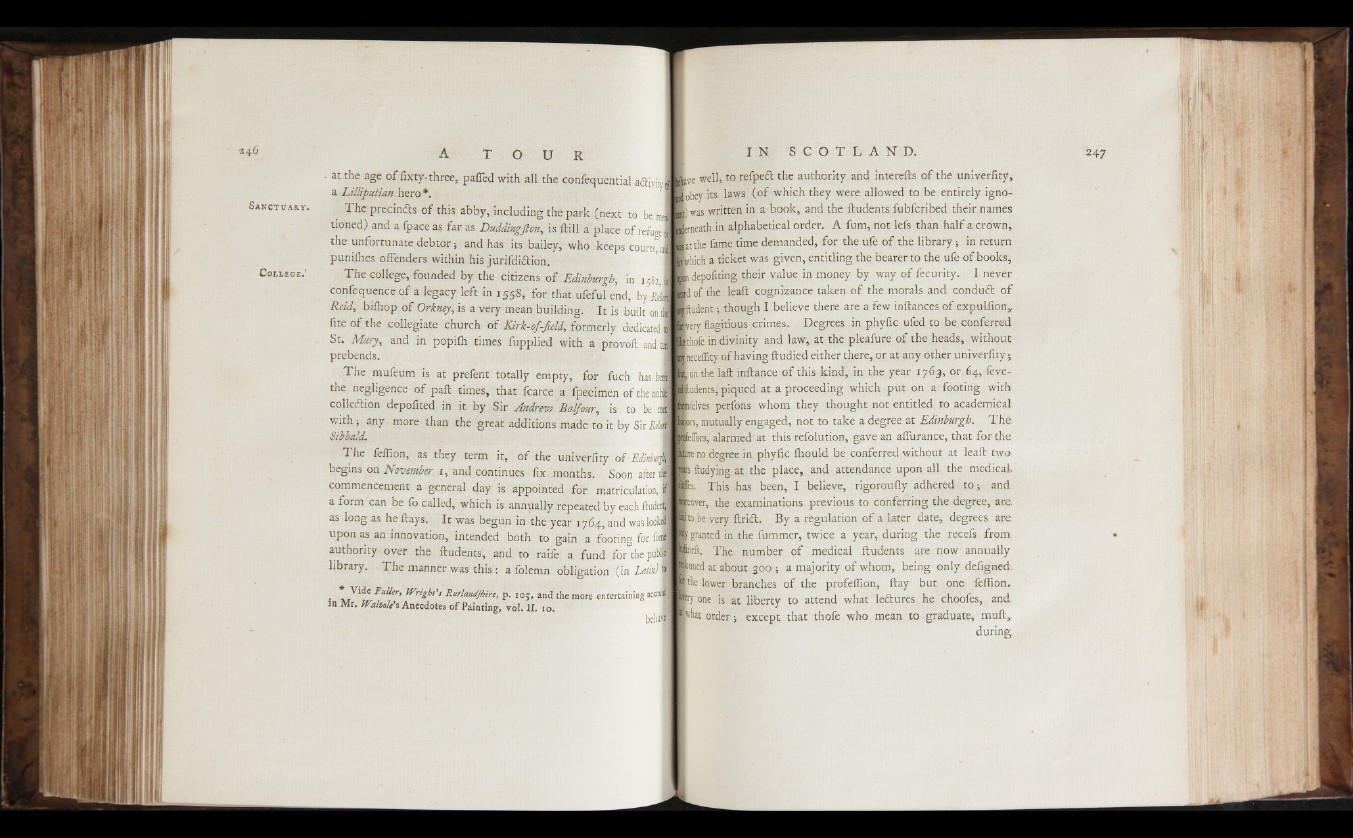
S a n c t u a r y .
C o l l e g e .'
l ave well, to refpeft the authority and interefts of the univerfity,
■obey its laws (of which they were allowed to be entirely igno-
at the age of fixty-three, palled with all the confequential achy
a Lilliputian hero*.
The precinfts of this abby, including the park (next to be me I w"s written in abook> and the ftudents fubfcribed thei
tioned) and a fpace as far as Duddingfton, is ftill a place of refuSc |
the unfortunate debtor; and has its bailey, who keeps courts] a|
puniihes offenders within his jurifdidtion.
The college, founded by the citizens of Edinburgh-, in 15
confequence of a legacy left in 1558, for that ufeful end, by]
Reid, bilhop of Orkney, is a very mean building. It is built St* fite of the collegiate church o f Kirk-of-field, formerly dedicated I St. Mary, and in popilh times fupplied with a provoft and tj
prebends.
The mufeum is at prefent totally empty, for fuch has beefl
the negligence of pail times, that fcarce a fpecimen of the nobl
collection depofited in it by Sir Andrew Balfour, is to be mg
with; any more than the great additions made to it by S i r l
SibbaltL
The feffion, as they term it, of the univerfity of-EdinhrM
begins on November 1, and continues fix months. Soon after t|
commencement a general day is appointed for matriculation, if
Irneath in alphabetical order. A fum, not lefs than half a crown,
latthe fame time demanded, for the ufe of the library ; in return
Buhich a ticket was given, entitling the bearer to the ufe of books,
1 depofiting their value in money by way of fecurity. I never
d of the leaft cognizance taken of the morals and condudl of
Iftudent; though I believe there are a few inftances of expulfionr
Ifolvery flagitious crimes. Degrees in phyfic ufed to be conferred
jjlthofe in divinity and law, at the pleafure of the heads, without
§iecdlity of having itudied either there, or at any other univerfity;
H| on. the lad inftance of this kind, in the year 1763, or 64, feve-
j*hidents, piqued at a proceeding which put on a footing with
lnfelves perfons whom they thought not entitled to academical
J lors, mutually engaged, not to take a degree at Edinburgh. The.
ffieffors, alarmed' at this refolution, gave an. affurance, that for the
:e no degree in phyfic ihould be conferred without at leaft two
I ts ftudying at the place, and attendance upon all the medical.
. This has been, I believe, rigoroufly adhered to; and
a form can be fo called, which is annually repeated by each ftudel | eover> the examinations previous to conferring the degn
as long as he ftays. It was begun in the year 1764, and was
upon as an innovation, intended both to gain a
authority over the ftudents, and to raife a fund for the publfl
library. The manner was this : a folemn obligation (in Latin)®
Vide Fuller, Wright’s Rutlandjhire, p. 10 ;, and the more entertaining awn*
in Mr. W slid e's Anecdotes o f Painting, v o l. II. 10.
belial
ree, are
[to.be very ftrict. By a régulation of a later date, degrees are
footing for foul I granted in the fummer, twice a year, during the recefs from
Inefs, The number of medical ftudents are now annually
Boned at about 300 ; a majority of whom, being only defigned.
I the lower branches of the profeffion, ftay but one feffion.
F7 one is at liberty to attend what leitures he choofes, and
P’hat order; except that thofe who mean to graduate, muft,
during.
l i l